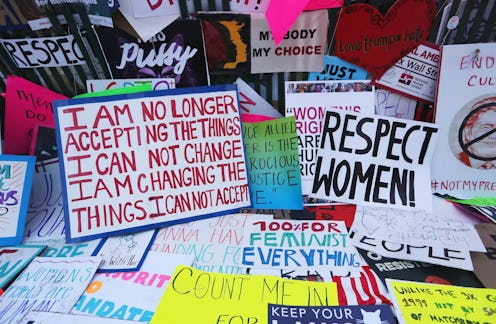I could write an article about big, glaring examples of gender inequality, like income and career opportunities and bodily autonomy. I have in the past, and I almost certainly will again. But right now, I want to talk about everyday examples of male privilege. They are so ingrained in our culture that we may not even notice them at first, but they have the ability to do just as much damage as the big picture ones.
This article is not saying that men have it easy, that men have nothing to complain about ever. This article is to highlight the ways that long-standing patriarchy and cultural misogyny leave certain members of our society at a distinct disadvantage on a daily basis. It is to point out that a gender binary does everyone a disservice. It is to remind people of their privileges, even if they seem minute. Do you know how exhausting it is to be told to smile almost every time I walk by myself? It's degrading.
Of course it is worth noting, too, that the gendered privilege we talk about typically refers to people who fit succinctly into one half of the gender binary. Many do not, and they often suffer more for it. Trans women, for example, are caught in the in-between, facing harassment if they "pass," but facing a crueler, more dangerous type of harassment if they do not. LGBT men are 20 percent more likely to face verbal abuse than their straight-identifying peers. And these are just two of many, many examples.
The next time that you witness one of these everyday instances of male privilege, note it. Point it out. Say something.
1. Tweeting Without Fear Of Sexual Harassment Or Other Forms Of Trolling
XO Jane writer Alex Blank Millard, exhausted from the constant violence and rape threats she experienced on Twitter, decided to change her Twitter photo to a white man. Her tweets remained the same, commenting on #rapeculture and feminism and receiving only positive responses. No one mentioned her appearance. No one threatened rape or violence. This is not to say that men don't also suffer from harassment online — they do, and all harassment is unacceptable — but as a notable Pew study found in 2014, women suffer disproprtionately from sexual harassment and stalking online.
2. Wearing An Outfit, Free Of Strangers' Opinions
Or not wearing an outfit! Either way! Women face scrutiny for wearing too little, for wearing too much — it often feels like we cannot win. It's lack of opinion that I consider a privilege. The lack of commentary. Wearing an outfit and people saying, "OK, that person is wearing an outfit" and leaving it at that.
3. Walking Alone, Day Or Night
As of 2012, women, regardless of their age, reported feeling unsafe walking alone at night in their neighborhood at a rate twice as high as men. But let's be real, walking alone during the day can prompt just as many anxieties for women. After surveying 2,000 people across the United States, Stop Street Harassment found that 65 percent of women had experienced street harassment, with 25 percent of men, many of whom identified as LGBTQA+, reporting similar harassment incidents.
4. Being Allowed To Frown In Public
Or simply being allowed to exist in public with any kind of expression other than smiling. I get told to smile on a weekly, if not daily basis. That is not an exaggeration. Mallory Ortberg of The Toast recently published this amazing article/slideshow comparing the patriarchy to an episode of The Simpsons, with the major takeaway being that the patriarchy requires "not only outward compliance but inner enthusiasm." Yes. This.
5. Not Having To Watch Your Drink At A Bar
In 2014, the CDC estimated that nearly 22 million adult American women (approximately one in five) have experienced rape; between nine and 10 million of those cases were alcohol- or drug-facilitated rape. Again, this is not to say that men cannot experience sexual assault; they do, and it is just as awful, no matter how the victim identifies. The point is that women suffer from it disproprtionately.
6. Doing Whatever You Want With Your Body Hair
One survey estimated that American women who shave will spend over $10,000 and two months of their lives removing "unwanted body hair." For women who wax, it's closer to $23,000. And it's not just our armpits — society dictates hair removal from our legs, pubic area, faces and eyebrows. Oh, and women shouldn't be bald on their heads, either. Our body hair is strictly policed in a way that men's is not, and it is, to put it bluntly, BS.
Images: Giphy (6)
